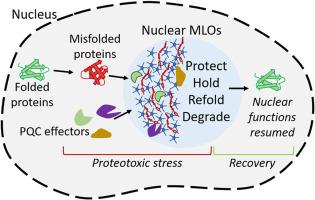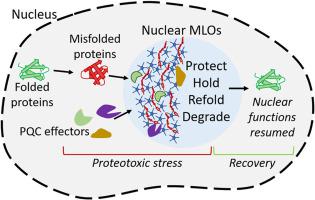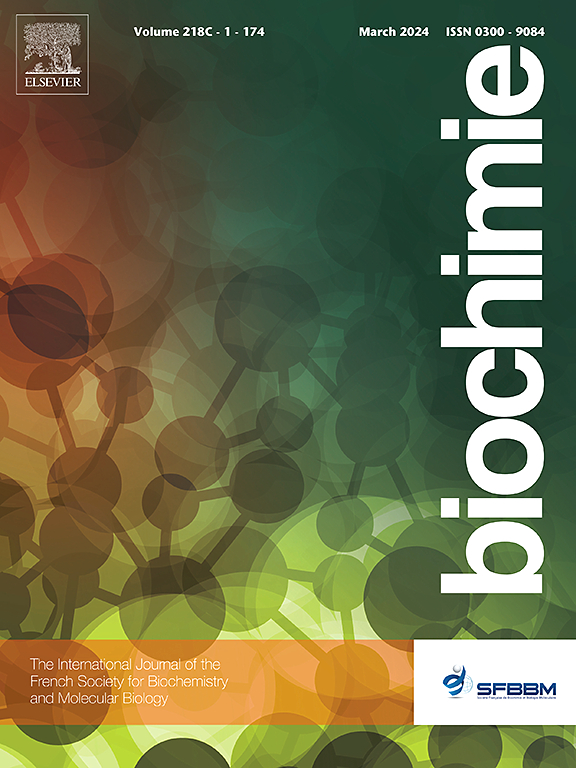Advances in nuclear proteostasis of metazoans
IF 3.3
3区 生物学
Q2 BIOCHEMISTRY & MOLECULAR BIOLOGY
引用次数: 0
Abstract
The proteostasis network and associated protein quality control (PQC) mechanisms ensure proteome functionality and are essential for cell survival. A distinctive feature of eukaryotic cells is their high degree of compartmentalization, requiring specific and adapted proteostasis networks for each compartment. The nucleus, essential for maintaining the integrity of genetic information and gene transcription, is one such compartment. While PQC mechanisms have been investigated for decades in the cytoplasm and the endoplasmic reticulum, our knowledge of nuclear PQC pathways is only emerging. Recent developments in the field have underscored the importance of spatially managing aberrant proteins within the nucleus. Upon proteotoxic stress, misfolded proteins and PQC effectors accumulate in various nuclear membrane-less organelles. Beyond bringing together effectors and substrates, the biophysical properties of these organelles allow novel PQC functions. In this review, we explore the specificity of the nuclear compartment, the effectors of the nuclear proteostasis network, and the PQC roles of nuclear membrane-less organelles in metazoans.


后生动物核蛋白稳态研究进展。
蛋白稳态网络和相关的蛋白质质量控制(PQC)机制确保了蛋白质组的功能,对细胞的存活至关重要。真核细胞的一个显著特点是高度区隔化,每个区隔都需要特定的、适应性强的蛋白稳态网络。对保持遗传信息和基因转录的完整性至关重要的细胞核就是这样一个区室。虽然对细胞质和内质网的 PQC 机制已经研究了几十年,但我们对细胞核 PQC 途径的了解才刚刚开始。该领域的最新进展强调了在核内对异常蛋白质进行空间管理的重要性。蛋白质毒性应激时,错误折叠的蛋白质和 PQC 效应子会在各种无核膜细胞器中积累。除了将效应物和底物聚集在一起外,这些细胞器的生物物理特性还允许 PQC 发挥新的功能。在这篇综述中,我们将探讨核区的特异性、核蛋白稳态网络的效应物以及元古宙无核膜细胞器的 PQC 作用。
本文章由计算机程序翻译,如有差异,请以英文原文为准。
求助全文
约1分钟内获得全文
求助全文
来源期刊

Biochimie
生物-生化与分子生物学
CiteScore
7.20
自引率
2.60%
发文量
219
审稿时长
40 days
期刊介绍:
Biochimie publishes original research articles, short communications, review articles, graphical reviews, mini-reviews, and hypotheses in the broad areas of biology, including biochemistry, enzymology, molecular and cell biology, metabolic regulation, genetics, immunology, microbiology, structural biology, genomics, proteomics, and molecular mechanisms of disease. Biochimie publishes exclusively in English.
Articles are subject to peer review, and must satisfy the requirements of originality, high scientific integrity and general interest to a broad range of readers. Submissions that are judged to be of sound scientific and technical quality but do not fully satisfy the requirements for publication in Biochimie may benefit from a transfer service to a more suitable journal within the same subject area.
 求助内容:
求助内容: 应助结果提醒方式:
应助结果提醒方式:


